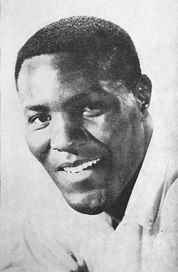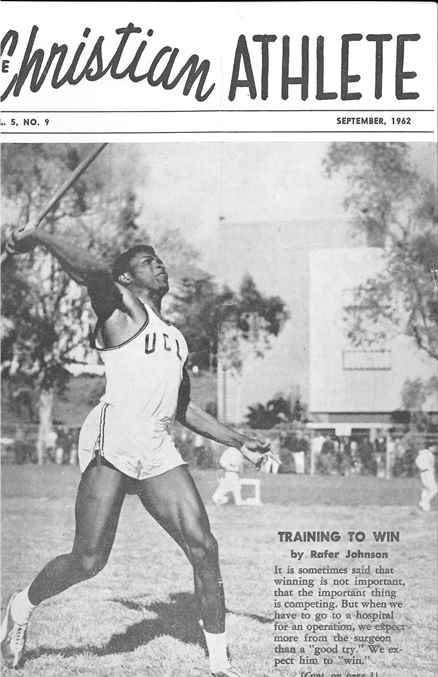by Rafer Johnson

This photo of Rafer Johnson appeared with the accompanying story in the September, 1962 issue of The Christian Athlete.
It is sometimes said that winning is not important, that the important thing is competing. But when we have to go to a hospital for an operation, we expect more from the surgeon than a “good try.” We expect him to “win.”
The same thing is true in sports. If the athlete thinks he will lose, he has lost already. Mental training is just as important as physical training. A record is broken because someone thinks he can do it. Although the real athlete doesn’t always take first place, he is in each event with one determination: to win.
I believe Ty Cobb is a good example of this. In one game in which he came up to bat, he was walked. Bt on first base, he watched his changed and stole second. Then he stole third. Finally, he stole home to score. This is the type of athlete I’d like to have on any team I belong to.
Ducky Drake, my coach at UCLA, once said, “When an athlete goes in for the decathlon seriously, it’s not just a matter of physical conditioning and training – it’s a whole way of life.”
I found this to be true. I started training for the 1960 Olympics right after the 1956 Olympics. By the time I was through working out each day in preparation for the ten events of the decathlon, there wasn’t much time left over for anything else. And these four years of preparation were not thought of simply as years leading up to good competition. I was determined to win.
But during the many years in which I have been training for athletic events, I have come to realize the greater importance of winning another kind of victory – victory in life. And I have come to realize too that I could never win this contest in my own strength.
I’ve attended church ever since I can remember. I can thank my mother and father for this, because they saw to it that their children attended Sunday school and church regularly. I was in the church choir, gave my offerings, and was, in general, very active in its program. But even with all my church activities, I was not sure that my life was lined up with God’s will.
On October 29, 1953, I realized that I could never be lined up with His will until I accepted His Son Jesus Christ by faith as my personal Savior. There wasn’t much emotion as I did this, but later, when I realized that He was blessing my commitment in many ways, the tears really flowed. I don’t know when I’ve ever felt happier. Since then I have come to see how anyone can achieve victory in life through Jesus Christ. We experience this when we acknowledge that the achievement is all his. Through our faith, we share in His victory.
Depending upon Him this way, I found that I could face problems without fear and discouragement. No matter how big or small the problem, He was always present and ready to help. Philippians 4:13 is certainly true: “I can do all things in him who strengthens me” (RSV).
Without His help I could not participate in athletics. He gave me an athletic body, good health and coordination, all so necessary in sports. And in the ten contests that make up the Olympic decathlon – running, jumping, throwing, for two long days – I know I couldn’t have succeeded without His strength.
I come to each athletic event conditioned physically and mentally. But spiritual conditioning is the most important of all. This means I am prepared to run each race, compete in each contest, not for my glory but for the glory of my Lord.
Ever since I became a Christian in my junior year of high school, I have loved Jesus Christ with all my heart. He is the leader of my life and without Him I would be lost for He is all.
During high school I had the pleasure of playing on many championship teams. In college, I had the same pleasure. During my years at UCLA, I have had the privilege of running on track teams that won the Pacific Coast Championship. Then, of course, the high privilege of representing my country in the 1956 and 1960 Olympic Games.
But as thrilling as it has been to belong to these great teams, I am more thrilled to be on the greatest team of all, the Christian team. Championships will soon be forgotten. Trophies grow tarnished and old. But the Christian team will go on to greater victories in Christ.
– FCA.org. –
Editor’s Note: The article appeared in the September, 1962 issue of The Christian Athlete, FCA’s flagship publication at the time. Rafer Johnson has a long history with FCA, dating back at least to the first FCA National Conference at Estes Park, Colo., in 1956, where he served as a Huddle leader. Just a few months later, he won the silver medal in the decathlon in the 1956 Olympics in Melbourne, Australia. Johnson won the gold medal in the 1960 Olympic Games in Rome, where he also served as the United States’ flag bearer in the opening ceremonies. Eight years later, Johnson and football star Rosey Grier (who has also been involved with FCA over the years), tackled Sirhan Sirhan moments after he fired the shot that took the life of Robert F. Kennedy. Johnson returned to Olympic glory in 1984, when he was tabbed with the honor of lighting the Olympic flame at the Los Angeles Memorial Coliseum.


I absolutely love Rafer Johnson! I am an assistant coach for the UCLA Women’s Basketball Team, so I have the honor of seeing Rafer on a regular basis as he and his wife are faithful supporters of our program and all of UCLA athletics. His love for Christ is apparent in his words and deeds. I’m so thankful to know a man who, as accomplished as he is, never hesitates to give God the glory! And we’re grateful that his daughter and son-in-law, Jenny and Kevin, serve the UCLA athletics community as chaplains! I love this family!